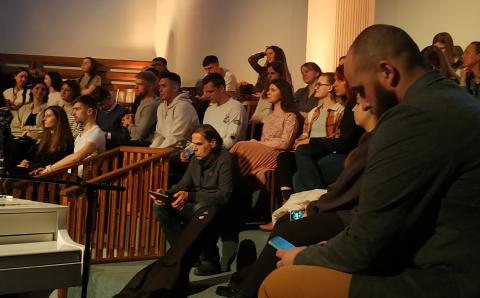Sarah Visser occasionally jets out of her office a few minutes early. It’s not that she’s uncommitted to her role—she loves her work with students and faculty at Calvin University as the executive vice president for student experience and strategy. But every now and then, Visser runs from work prematurely to catch a glimpse of her daughter’s fifth-grade volleyball game.
It’s a delicate balance of caring for her three children while shepherding the almost 4,000 students and faculty at Calvin. And it’s a role she doesn’t take lightly.
“As a woman in leadership, I’m often asked about work-life balance. I find it nearly impossible to strike absolute balance, but I’m drawn to the concept of integrated living,” Visser explained. “I am a whole person, and that means that I bring all of who I am into everything I do. I can’t compartmentalize different areas of my life.”
How she leads as a mom, she noted, spills into how she leads as a professional. And how she leads as a professional makes a difference in the way she parents. The two go hand in hand.
As a woman in a high-visibility position, Visser said, she uses her role to mentor and come alongside the other women in her purview. She encourages them to bring their entire selves—as mothers, daughters, sisters, wives, and friends—into the workplace.
“Your vocation is not a job,” Visser explained. “It’s who you’re called to be. Where is God asking you to lead in your life?”
Much of Visser’s leadership philosophy is undergirded by the concept of imago Dei: everyone is created in God’s image. Regardless of one’s gender, she said, fully “showing up” in one’s leadership roles is an act of faithfulness and points others to God’s creativity and complexity. We all benefit when every individual recognizes her or his unique calling as an agent of renewal in God’s world.
“Organizations and communities are healthier when we have the full spectrum of voices around the table,” Visser said. “Without women or other forms of diversity in leadership speaking into things, we are not able to fully live into all God has designed.”
When Jesus faced his darkest days, it was the women who surrounded him, who joined him at the foot of the cross, and who were the first to testify to the empty tomb. Indeed, women’s faithful leadership is honored throughout the biblical narrative. Visser sees this in her own story as well.
“I have seen that women can often sit in the emotion of things. They can walk toward the hard conversations and approach work conflicts with poise, grace, and warmth. Many of the women leaders I admire have demonstrated an ability to navigate challenges with grace, presence, and hope. … God uses all components of our lives to help us lead and complete the work he’s set before us, whether that’s in the home, the workplace, the community, or the church,” she concluded. “I may not be sufficient to complete the tasks at hand, but that’s OK. When I lean into Jesus, I am reminded that he is more than sufficient to help me complete everything he’s called me to do.”









